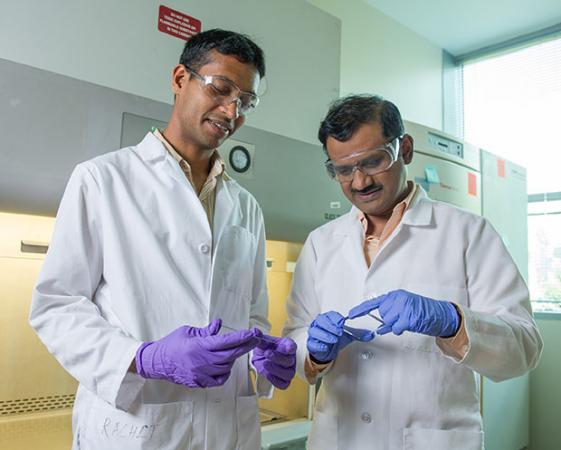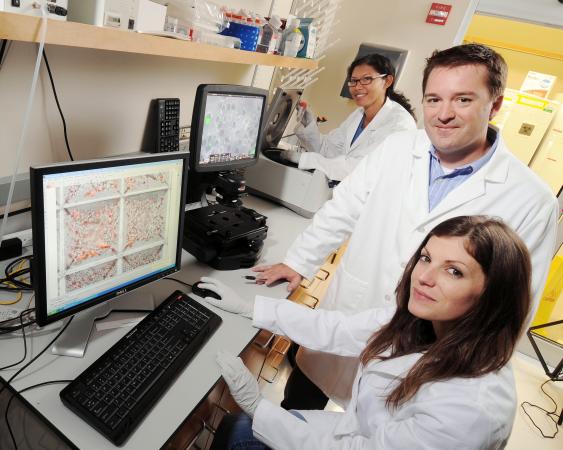The University System of Georgia Board of Regents has approved the appointment of Krishnendu (Krish) Roy and Todd McDevitt to Carol Ann and David D. Flanagan Faculty Professorships in the Wallace H. Coulter Department of Biomedical Engineering at Georgia Tech and Emory University. These appointments, generously endowed by the Flanagans in 2011, serve to recognize and reward faculty that are conducting high impact research and are exemplary citizens of the Wallace H. Coulter department and Georgia Tech as a whole. Both Roy and McDevitt are bringing cutting-edge research and thought leadership to the burgeoning fields of immunoengineering and regenerative medicine.
McDevitt is an associate professor in the Coulter Department, a Petit Faculty Fellow in the Petit Institute for Bioengineering and Bioscience, and director of the Stem Cell Engineering Center at Georgia Tech. The objective of McDevitt’s research program is to develop enabling technologies for the directed differentiation of stem cells for regenerative medicine, disease models, and diagnostic applications. Much of his research focuses on the application of technologies to engineer stem cell fate, on stem cell bioprocessing and on engineering regenerative therapies from stem cells. McDevitt has garnered more than $9 million in funding, including a Transformative R01 award from the NIH and an NSF IGERT on Stem Cell Biomanufacturing. He received the 2010 Society for Biomaterials Young Investigator Award, a New Investigator Award from the American Heart Association and was recognized as one of the “40 Under 40” by Georgia Trend magazine. McDevitt graduated cum laude from Duke University, with a B.S.E. and a double major in Biomedical and Electrical Engineering. He received his Ph.D. in 2001 in Bioengineering from the University of Washington, where he worked for Patrick S. Stayton, and where he conducted post-doctoral research in the pathology laboratory of Charles E. Murry.
Roy joined the Coulter Department this summer as professor and is currently the director of the Center for Immunoengineering. He is an elected Fellow of the American Institute for Medical and Biological Engineering (AIMBE) and a Fellow of the Biomedical Engineering Society (BMES). He received his B.S. from the Indian Institute of Technology, M.S. from Boston University and his Ph.D. in Biomedical Engineering from Johns Hopkins University. Following his Ph.D., he joined a start-up biotechnology company, Zycos Inc., where he served as a senior scientist in drug delivery research. He joined The University of Texas at Austin in 2002, where most recently he was professor of Biomedical Engineering. He also served as the director of the graduate program and as associate chair for education and outreach. His research interests are in the areas of immunoengineering with particular focus on material-directed cells signaling and immune cell generation and controlled drug and vaccine delivery technologies with applications in cancer and immunotherapies. Roy has received the Young Investigator Awards from The Society for Biomaterials (SFB) and the Controlled Release Society (CRS). He has been extensively funded by NIH, NSF, the Coulter Foundation, the Whitaker Foundation and the Cancer Prevention And Research Institute of Texas, among others. He serves as a member of the editorial boards for the Journal of Controlled Release and the European Journal of Pharmaceutics and Biopharmaceutics.
Georgia Tech and Emory created the joint department of biomedical engineering in the fall of 1997. The collaborative relationship blends the expertise of medical researchers at the Emory University School of Medicine with that of the engineering faculty at Georgia Tech, and is the first of its kind between a public and private institution. The collaboration has resulted in a biomedical engineering program that consistently ranks among the top five in the nation by U.S. News & World Report.
Media Contact
Adrianne Proeller
Keywords
Latest BME News
Jo honored for his impact on science and mentorship
The department rises to the top in biomedical engineering programs for undergraduate education.
Commercialization program in Coulter BME announces project teams who will receive support to get their research to market.
Courses in the Wallace H. Coulter Department of Biomedical Engineering are being reformatted to incorporate AI and machine learning so students are prepared for a data-driven biotech sector.
Influenced by her mother's journey in engineering, Sriya Surapaneni hopes to inspire other young women in the field.
Coulter BME Professor Earns Tenure, Eyes Future of Innovation in Health and Medicine
The grant will fund the development of cutting-edge technology that could detect colorectal cancer through a simple breath test
The surgical support device landed Coulter BME its 4th consecutive win for the College of Engineering competition.









